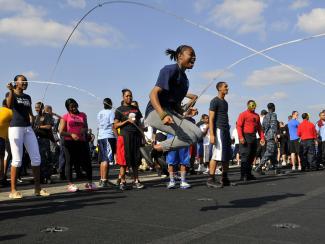
Via Pixabay
Double dutch is still a welcome sight on sidewalks and playgrounds in Black communities throughout America. But where did it come from, and how did it become the nationally competitive sport it is today?
Double dutch is a forgotten Black community staple that goes back thousands of years. “Rope skipping” was done in Ancient Egypt and China, and eventually Europe. Dutch colonists brought the two-rope version over to America in the 1600s, which is why it was called “double dutch.”
Double dutch took off in New York in the 1930s. When David A Walker of the NYPD saw that girls in his neighborhood had fewer opportunities to play sports, but had perfected double dutch with their rhymes and creative moves, he envisioned the game’s full potential.
In 1973, he developed a set of rules - and competitive double dutch was born.
The Fantastic Four were the queens of double dutch in the late 70s and 80s. Serving rhymes and freestyle dance energy, the group inspired and became a major part of the growing hip-hop movement.
They and other double dutch crews performed on the dance floor at hip-hop club nights and even traveled to Europe with the New York City Rap Tour!
While double dutch isn’t as popular today, national double dutch competitions are still held and the sport is still taught at schools across the country, especially in Black communities. It’s also popular across the globe!
The teamwork, fitness, low-cost investment, and creativity of double dutch - especially its rhymes and songs - have made it a lasting cultural touchstone in Black communities.